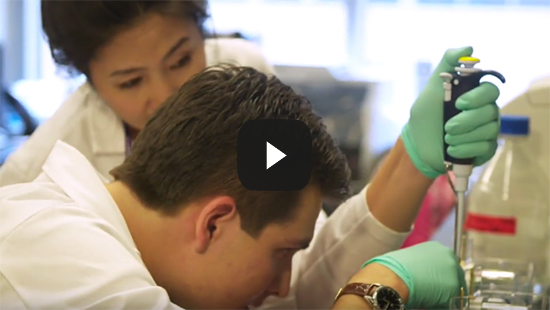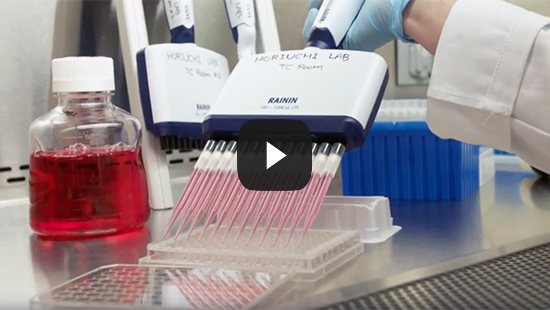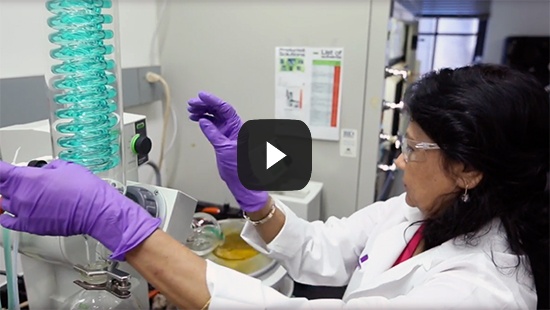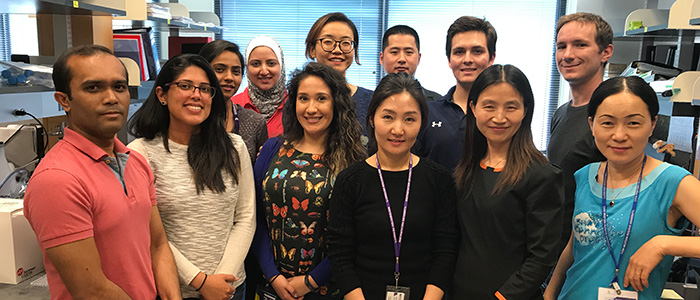Cancer Pharmacology
Cancer pharmacology is the study of the molecular and cellular mechanisms of cancer cells and the identification of novel therapeutic targets and treatment strategies. Faculty in the department study basic mechanisms responsible for cancer and its spread (metastasis) with the goal of finding new molecular targets for destroying cancer cells. An emphasis on difficult to treat breast cancer subtypes, which includes research on cancer stem cells, is leading to discoveries of new disease mechanisms and drug targets.
Our Work
Investigating the Root Cause of Cancer
Huiping Liu, MD, PhD, associate professor of Pharmacology, studies cancer stem cells and how they can be used to create new therapies that eradicate the root cause of cancers.
Uncovering the Biological Mechanisms of Aggressive Breast Tumors
Dai Horiuchi, PhD, assistant professor of Pharmacology, and his team are devoted to understanding the cellular events that influence the aggressive of breast tumors and discovering new therapeutic strategies to treat those tumors.
Pioneering Academic Drug Discovery
Daniel Martin Watterson, PhD, professor of pharmacology and John G. Searle Professor of Molecular Biology and Biochemistry, studies biological mechanisms important in how cells communicate with each other. The work is advancing basic and translational knowledge about critical biological processes and molecules that regulate physiological pathways, and how they are altered in diseases such as Alzheimer’s disease, brain injury and cancer. The goal is to develop novel drug treatments that can intervene in disease progression.
Cancer Pharmacology Research Labs
Daniel Arango LabInvestigating the role of post-transcriptional modifications of RNA in the proliferation, differentiation, and survival of cancer cells
Investigating the role of post-transcriptional modifications of RNA in the proliferation, differentiation, and survival of cancer cells
Research Description
Translation is the mechanism by which proteins are made from the information stored in the genetic code. This process is achieved with the help of RNA molecules such as ribosomal RNA (rRNA), transfer RNA (tRNA), and messenger RNA (mRNA). While translation is a tightly regulated process, global perturbations in protein synthesis are observed in stress conditions, cancer, and aging, highlighting the regulatory mechanisms of translation as potential targets in cancer and age-related disorders. One poorly characterized layer of translation regulation is the epitranscriptome, defined as the set of more than 140 ribonucleotide modifications that alter the biochemical properties and function of all classes of RNA, including rRNA, tRNA, and mRNA. While the distribution and function for most ribonucleotide modifications are undefined, the enzymes responsible for depositing RNA modifications are dynamic and sensitive to metabolic alterations, potentially regulating the temporal response to stress or the onset of human diseases such as cancer.
Our group investigates the mechanisms by which RNA modifications regulate protein synthesis and how these mechanisms affect cell fate decisions such as cell proliferation, survival, and differentiation in cancer and stress conditions. By integrating RNA biology, transcriptomics, and cell biology, we aim to uncover novel mechanisms of gene expression regulation and generate new tools that can be harnessed to develop anti-cancer therapies.
For more information, see Dr. Arango's faculty profile and laboratory website.
Current Projects
- Mechanisms and regulation of RNA acetylation in cancer cells
- Regulation of stress response by RNA modifications
- Targeting RNA-modifying enzymes and RNA modifications for therapeutic purposes
Publications
See Dr. Arango's publications.
Contact
Contact Dr. Arango at 312-503-0732.
Paul Burridge LabInvestigating the application of human induced pluripotent stem cells to study the pharmacogenomics of chemotherapy off-target toxicity and efficacy
Investigating the application of human induced pluripotent stem cells to study the pharmacogenomics of chemotherapy off-target toxicity and efficacy
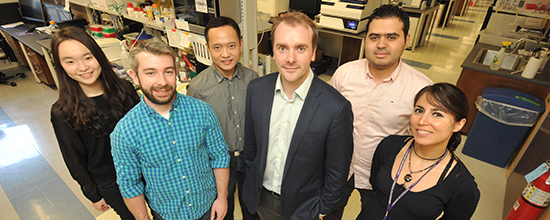
Research Description
The Burridge lab studies the role of the genome in influencing drug responses, known as pharmacogenomics or personalized medicine. Our major model is human induced pluripotent stem cells (hiPSC), generated from patient's blood or skin. We use a combination of next generation sequencing, automation and robotics, high-throughput drug screening, high-content imaging, tissue engineering, electrophysiological and physiological testing to better understand the mechanisms of drug response and action.
Our major effort has been related to patient-specific responses to chemotherapy agents. We ask the question: what is the genetic reason why some patients have a minimal side effects to their cancer treatment, whilst others have encounter highly detrimental side-effects? These side-effects can include cardiomyopathy (heart failure or arrhythmias), peripheral neuropathy, or hepatotoxicity (liver failure). It is our aim to add to risk-based screening by functionally validating genetic changes that predispose a patient to a specific drug response.
Recent Findings
- Human induced pluripotent stem cells predict breast cancer patients’ predilection to doxorubicin-induced cardiotoxicity
- Chemically defined generation of human cardiomyocytes
Current Projects
- Modeling the role of the genome in doxorubicin-induced cardiotoxicity using hiPSC
- Investigating the pharmacogenomics of tyrosine kinase inhibitor cardiotoxicity
- hiPSC reprogramming, culture and differentiation techniques
- High-throughput and high-content methodologies in hiPSC-based screening
For lab information and more, see Dr. Burridge’s faculty profile and lab website.
Publications
See Dr. Burridge's publications on PubMed.
Contact
Contact Dr. Burridge at 312-503-4895.
Lab Staff
Postdoctoral Fellows
Malorie Blancard, Hananeh Fonoudi, Mariam Jouni, Davi Leite, Tarek Mohamed, Disheet Shah
Graduate Students
Liora Altman-Sagan, Raymond Copley, K. Ashley Fetterman, Phillip Freeman, Donald McKenna, Emily Pinheiro, Marisol Tejeda, Carly Weddle
Technical Staff
Debabrata Chakravarti LabEpigenome and 3D chromatin organization dysregulations define human cancers and reproductive diseases
Epigenome and 3D chromatin organization dysregulations define human cancers and reproductive diseases
Research Description
Dr. Chakravarti’s research is focused on understanding epigenetic and transcriptional regulation of human tumorigenesis. One of his research projects is focused on understanding the mechanisms that drive the development of uterine fibroids and endometriosis that affect an alarmingly high number of all women. In another project, Dr. Chakravarti’s research team investigates molecular underpinning of contribution of transcription factors, cofactors and epigenomic and 3D genome reorganization regulation of prostate Cancer that affects a large number of men worldwide. In a third project the laboratory determines the role of protein cofactors in regulation of cell cycle genes. Thus, our work interfaces both fundamental and translational research on diseases that affect humankind. It is our hope that when combined with results from others, our research will contribute to the development of future therapeutics. Dr. Chakravarti gratefully acknowledges continuous funding support from the NIH and key roles of his lab members and collaborators in the overall success of the Chakravarti Laboratory.
Dr. Chakravarti also enjoys teaching. He has continuously taught both medical and graduate students. He serves on numerous Ph.D thesis committees. He has trained a large number of graduate students and postdoctoral fellows some of whom are now independent investigators at this and other institutions.
For more information, please see, visit the Dr. Chakravarti's faculty profile.
Publications
See Dr. Chakravarti's publications in PubMed.
Associate Editor: Endocrinology 2017-present; Editorial Board: Molecular Endocrinology 2011- present, Mol. Cell. Biol. 2014-present
The Editor of a Book volume on “Regulatory Mechanisms in Transcriptional Signaling” in Progress in Molecular Biology and Translational Science (Vol 87), published in Aug 2009, Academic Press, Chakravarti, D. Editor
Contact Us
312-503-1641
Dai Horiuchi Lab Understanding the cellular events that influence the aggressiveness of tumors and patient clinical outcome
Understanding the cellular events that influence the aggressiveness of tumors and patient clinical outcome

Research Description
The major focus of the Horiuchi lab, established on April 1, 2015, is on the mechanisms of tumor maintenance and progression in breast cancer and to identify novel therapeutic targets and treatment strategies. To achieve these goals, we utilize a collection of human breast cancer cell lines, preclinical animal models and high-throughput screening approaches along with state-of-the-art bioinformatics through collaboration with experts in the field.
We are currently focused on the following areas:
- Mechanisms of tumor maintenance and progression medicated by proto-oncogenes (i.e., MYC transcription factor, PIM family of serine/threonine kinases, etc.), their activators and effectors and the tumor microenvironment.
- Biology and therapeutic targetability of novel molecular factors that determine patient clinical outcome.
For lab information and more, see Dr. Horiuchi’s faculty profile.
Publications
See Dr. Horiuchi's publications on PubMed.
Contact
Contact Dr. Horiuchi at 312-503-4085 or the lab at 312-503-4349.
Lab Staff
Technical Staff
Zhe Ji LabDissecting the regulation of gene transcription and RNA translation underlying oncogenic processes.
Dissecting the regulation of gene transcription and RNA translation underlying oncogenic processes.
Research Description
Cancer happens through accumulated genetic mutations and epigenetic alternation in normal cells. With the advances of genomic technologies, we now can precisely characterize the genome-wide alternations of gene expression underlying oncogenic processes in a cost-effective and unbiased manner. My lab will use the combined experimental genomic technologies and computational modeling to examine the regulation of gene transcription and RNA translation during steps of oncogenesis. We aim at revealing novel cancer therapeutic targets and strategies for precision medicine and immunotherapy.
Current Projects
Currently, we are working on the following projects.
- Characterizing the transcriptional regulatory circuits mediating inflammation in the cancer microenvironment.
- Examining the genome-wide regulation of RNA translation in cancers.
- Defining the functional roles of non-canonical translation in lncRNAs, pseudogenes and 5’UTRs in cancers.
For lab information and more, see Dr. Ji's faculty profile.
Publications
See Dr. Ji's publications on PubMed.
Contact
Contact Dr. Ji at 312-503-2187.
Lab Staff
Postdoctoral Fellows
Graduate Students
Hiroaki Kiyokawa LabInvestigating the roles of cell cycle-regulatory proteins in differentiation, senescence and tumorigenesis and the cell cycle control in endocrine and reproductive organs
Investigating the roles of cell cycle-regulatory proteins in differentiation, senescence and tumorigenesis and the cell cycle control in endocrine and reproductive organs
Research Description
We are interested in the basic mechanisms of cell cycle control, cellular senescence/immortalization and malignant transformation, with a focus on protein regulation by ubiquitination. We previously demonstrated that cell cycle regulators such as p27Kip1, CDK4 and CDC25A play highly tissue-specific roles in development and oncogenesis. Ubiquitination, the covalent modification of substrate proteins with the small 76-residue protein ubiquitin, exerts diverse regulation of the fate of substrates, including the cell cycle regulators, e.g, promoting proteolysis, altering subcellular localization and modulating enzymatic activities. Our current research is aimed at revealing novel functions of ubiquitination enzymes and their substrates in development and cancer, which is expected to identify new therapeutic targets against human diseases. The laboratory uses a combination of protein engineering, proteomics, bioinformatics, cell biological techniques such as time-lapse microscopy and 3-D culture and genetically engineered mouse models. Keywords: cell cycle, ubiquitin, ubiquitination, cancer initiation, cancer progression, knockout mice, transgenic mice, breast cancer, cyclin, diabetes, pituitary, development.
Recent Findings
- There is a unique regulation of cell cycle progression in neuroendocrine tissues such as pancreatic islets and pituitary glands of CDK4-null mice; we have shown that in this particular type of cell cycle, Cdk4 plays an indispensable and rate-limiting role
- CDC25A phosphatase, which activates CDK2 and CDK1, is an oncogene that plays a rate-limiting role in initiation and progression of various tumors, including breast cancer
Current Projects
We are currently investigating roles of the cell cycle machinery in differentiation, tumorigenesis and apoptosis, by combinations of mouse models and molecular analyses.
For lab information and more, see Dr. Kiyokawa’s faculty profile.
Publications
See Dr. Kiyokawa's publications on PubMed.
Contact
Contact Dr. Kiyokawa at 312-503-0699.
Lab Staff
Technical Staff
Cade Brittain, Alison Rogozinski
Temporary Staff
Huiping Liu LabUnderstanding and targeting cancer stem cells and exosomes in metastasis using cutting-edge technology and novel therapeutics
Understanding and targeting cancer stem cells and exosomes in metastasis using cutting-edge technology and novel therapeutics
Research Description
The Liu lab studies the molecular and cellular mechanisms underlying cancer stem cells (CSCs) and metastasis through four ongoing interactive basic and translational research projects: (1) to understand CSCs, circulating tumor cells (CTCs) and their interactions with immune cells in metastasis; (2) to dissect the role of secreted and circulating exosomes in CSC functions; (3) to target CSCs with novel therapeutics, exosomes and nanoparticles in combination with immunotherapy; (4) to develop CTC and circulating exosome-based biomarkers for cancer diagnosis, therapy response and predictive prognosis.
Recent Findings
- CSCs seed metastases of breast cancer.
- A rapid, automated surface protein profiling of single circulating exosomes in human blood. (PMID: 27819324)
- Micro-206 inhibits stemness and metastasis of breast cancer by targeting MKL1/IL11 pathway. (PMID: 27435395)
- Differentiation and loss of malignant character of spontaneous pulmonary metastases in patient-derived breast cancer models. (PMID: 25339353)
- MicroRNA-30c inhibits human breast tumor chemotherapy resistance by regulating TWF1 and IL-11.(PMID: 23340433)
Current Projects
- Identify how CSCs crosstalk between themselves and interplay with immune cells in circulation thus developing innovative anti-CSC targeting therapeutics.
- Single cell RNA sequencing of CSCs and metastatic tumors.
- Dissect the role of exosomes in CSC functions and regulation of exosome functions by CSCs.
- Develop CSC-targeting novel microRNA therapeutics and exosome delivery tools.
- Discover CTC and circulating exosome-based clinical biomarkers for cancer diagnosis, treatment monitoring and prognosis.
For lab information and more, see Dr. Liu's faculty profile and lab website.
Publications
See Dr. Liu's publications on PubMed.
Contact
Contact Dr. Liu at 312-503-5248.
Lab Staff
Research Faculty
Postdoctoral Fellows
Nurmaa Dashzeveg, Lamiaa El-Shennawy, Andrew Hoffmann
Graduate Students
Hannah Mubarak, Emma Schuster, Erika K. Ramos, David Scholten
Visiting Scholars
Gabriel Rocklin LabWe develop high-throughput methods for protein biophysics and protein design, with a focus on protein therapeutics
We develop high-throughput methods for protein biophysics and protein design, with a focus on protein therapeutics
Research Description
Key questions include: How do protein sequence and structure determine folding stability, conformational dynamics, and resistance to aggregation/degradation-inducing stresses? Can we quantitatively predict these protein "phenotypes" from genotype (sequence) using computational modeling? How do we design protein therapeutics that optimize these phenotypes for a particular application? To answer these questions, we combine large-scale de novo computational protein design with high-throughput methods such as display selections, mass spectrometry proteomics, and next-generation sequencing, enabling us to test thousands of proteins in parallel. By combining these technologies, we seek to develop efficient "design-test-analyze" cycles, iterating our way to an improved, quantitative understanding of protein biophysics and more advanced protein therapeutics.
For lab information and more, see Dr. Rocklin's faculty profile and lab website.
Publications
See Dr. Rocklin's publications on PubMed.
Contact
Contact Dr. Rocklin at 312-503-4892.
Lab Staff
Postdoctoral Fellows
Sugyan Dixit, Jane Thibeault, Kotaro Tsuboyama
Graduate Students
Tae-Eun Kim, Cydney Martell, Claire Phoumyvong
